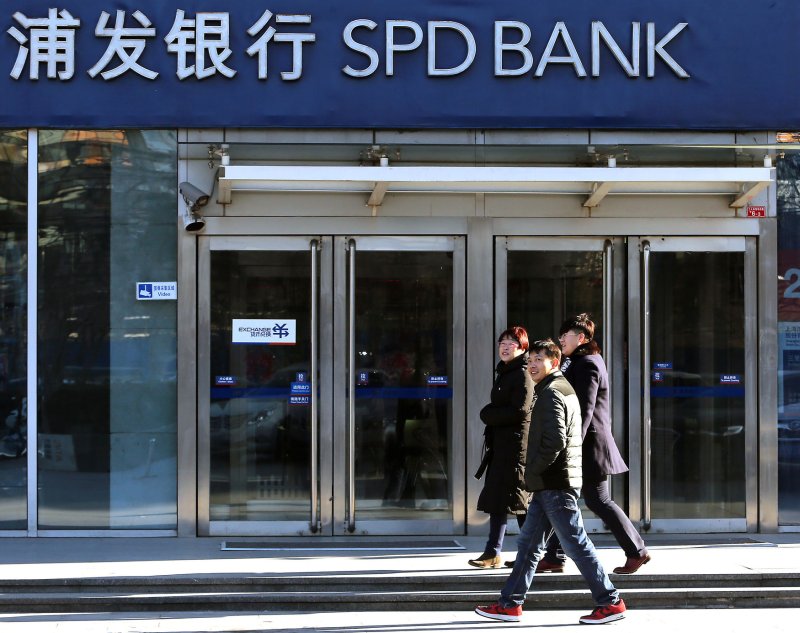A big decline in China's stock markets is affecting global markets. Photo by Stephen Shaver/UPI |
License Photo
If the first 10 days of the new year are indicative of the economic outlook for 2016, buckle up.
The precipitous decline in China's stock markets has had dramatic financial and economic effect on global markets. The drop in oil prices to above $30 a barrel earlier this week will bring further turmoil.
So are we seeing the beginning of a global recession possibly as crippling as the 2008 financial meltdown was? Or is this merely a readjustment magnified by China's economic troubles that will settle out? Strong arguments can be mounted on both sides.
Regarding a recession, here is why global economies may be headed for rough times. The shift in demand and consumption from the developed economies to the BRIC's -- Brazil, Russia, India and China -- and emerging markets is considerable, and now accounts for more than 55 percent of the global total, with three of the BRIC in some form of potentially grave economic difficulty.
China's real estate and market bubbles may burst. As consumer demand decreases, so, too, does Chinese appetite for imports, causing a global slowdown. Currencies are affected. Because of globalization, keeping this malaise from spreading may be impossible. Likewise the decline in the price of oil is doing great damage to the energy industry and obviously the foreign currency reserves of the energy-producing states.
To the degree that price-to-earnings ratios matter, in the United States historically, they averaged 14 -16/1. Today, P/E's are running much higher, suggesting that stocks are overpriced. Hence, a market adjustment may be greatly accelerated by any economic slowdowns. The conclusion is a very bearish outlook.
Making the opposite case, in the United States, unemployment is running at about 5 percent. Job creation continues at a rapid pace. The economy is still growing, although modestly. Automotive sales set a record last year of more than 17 million. Interest rates remain low, and corporate profits appear sound.
In this analysis, declines in share prices will produce opportunities that can rejuvenate the bourses and stock exchanges, particularly in America where fixed income investments, i.e. bonds, still have relatively low yields in exchange for providing more security for the holders. Besides, over the long term and through depressions and recessions, equities markets ultimately grow and over time provide the larger returns on investment.
But who really knows? Economies and markets evolve, and past experience and history may or may not be relevant. The great 1987 stock market collapse; the bursting of the dot.com bubble in the late 1990s; and the 2007-08 financial crises stemmed from different causes and were resolved by different means, including the passage of time.
For those who regard a recession as the most likely outcome this year, given that monetary policy, i.e. interest rates, offers little positive leverage, fiscal policy, i.e. budgets, greater deficit spending is the way out. This Keynesean approach will increase the national debt that is about 100 percent of annual GDP approaching $20 trillion. However, so this argument goes, as the economy improves, so, too, will the revenue tax base ultimately allowing reducing debt and deficit.
Those who are more bullish are likely to argue that tax cuts and changes on the margin will be sufficient, as the economy is still sound. Time will settle this debate. But common sense argues that it may not be wise to wait. What to do is the issue.
How can the economy be stimulated without increasing the debt, which both deficit spending and tax cuts will do? The answer is remarkably simple: U.S. corporations hold bout $1 trillion to $2 trillion in cash outside the United States. That money can be repatriated if there is a valid mechanism.
I have long argued for a national infrastructure bank, including in my latest book, A Handful of Bullets---How the Murder of Archduke Franz Ferdinand Still Menaces the Peace. The nation's infrastructure is in dire disrepair. These repatriated funds, if invested in this bank, would receive tax relief. The bank would be open to other investors as war bonds once were. Interest payments over, say 30 years of 200 or 250 basis points above prime, would be guaranteed by the federal government and paid for along with the principal from tolls, user fees and the like from these infrastructure projects.
Some $1 trillion or $2 trillion would surely stimulate the economy. Whether that prevents or relieves a recession is moot. However, repair of the infrastructure would, at the least, set this country on a powerful economic footing for the 21st century.
_________________________________________________________________
Harlan Ullman is UPI's Arnaud de Borchgrave Distinguished Columnist; chairman of the Killowen Group that advises leaders of government and business; and senior adviser at Washington, D.C.'s, Atlantic Council and Business Executives for National Security. His latest book is "A Handful of Bullets: How the Murder of Archduke Franz Ferdinand Still Menaces the Peace."















